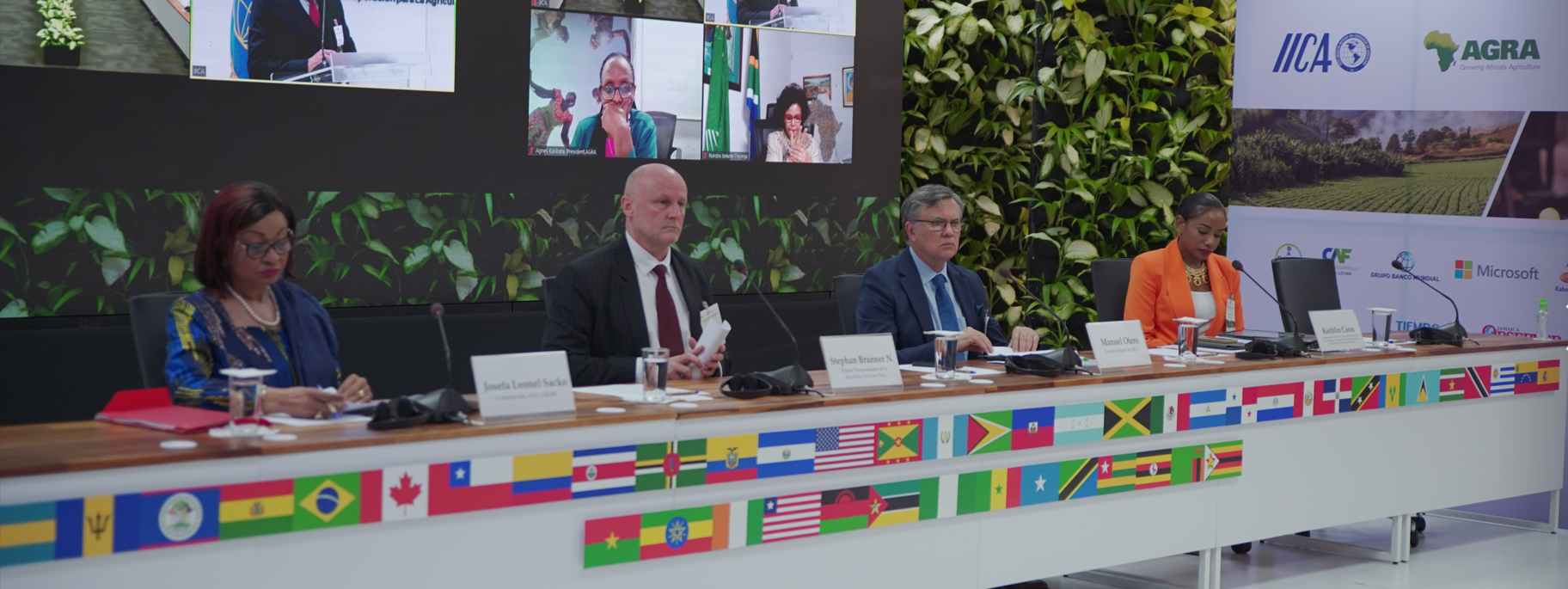The Summit, which seeks to foster the sharing of experiences to accelerate positive transformations in agrifood systems, was convened and organized by the Inter-American Institute for Cooperation on Agriculture (IICA), the African Union Development Agency -New Partnership for Africa’s Development (AUDA-NEPAD) and the Alliance for a Green Revolution in Africa (AGRA) at a particularly momentous point in time, when global food security is being threatened by a war and overlapping health and environmental crises.

San Jose, 27 July 2022 (IICA) – Ministers, deputy ministers and high-ranking officials of Agriculture, Environment and Science and Technology from some 40 countries officially opened the first “Africa-Americas Summit on Agrifood Systems” in Costa Rica, with a view to strengthening bi-regional cooperation to face global food security challenges and strengthen the role of both continents in terms of productivity.
The Summit, which seeks to foster the sharing of experiences to accelerate positive transformations in agrifood systems, was convened and organized by the Inter-American Institute for Cooperation on Agriculture (IICA), the African Union Development Agency-New Partnership for Africa’s Development (AUDA-NEPAD) and the Alliance for a Green Revolution in Africa (AGRA) at a particularly momentous point in time, when global food security is being threatened by a war and overlapping health and environmental crises.
“The global agrifood system will face very specific challenges in the coming decades. The first one will be to feed nearly 9.5 billion people in 2050; the second one is to maintain and protect the natural resources on which agricultural and fishing production is based, including biodiversity; the third, to face climate change with mitigation and adaptation measures in addition to the changes that are already inevitably emerging”, said Stephan Brunner, Vice President of Costa Rica, one of the speakers who gave opening remarks at the meeting.
The Commissioner of the Department of Agriculture, Rural Development, Blue Economy and Environmental Sustainability of the African Union Commission, Josefa Leonel Sacko; the President of AGRA, Agnes Kalibata; the Executive Director of the African Union Development Agency (AUDA-NEPAD), Nardos Bekele-Thomas; the IICA Special Ambassador for the First Africa-Americas Summit and IICA Goodwill Ambassador on Sustainable Development Issues, Keithlin Caroo; and the Director General of IICA, Manuel Otero, were also speakers at the opening ceremony of the Summit.
“This Summit is happening at an opportune time, when the world is facing increases in food prices that particularly affect poor and developing countries. Even before the Covid-19 pandemic, there were already disruptions in supply chains”, said Josefa Leonel Sacko.
“If we want to put an end to hunger –she added–, and comply with the Sustainable Development Goals (SDGs) and the 2030 Agenda, we are moving in the wrong direction. It is urgent to deal with malnutrition and hunger in Africa; and in Latin America and the Caribbean, the situation is not very different. We have young populations, and a partnership between the two continents is more important now than ever before, because we face the common challenge of building more sustainable and inclusive agrifood systems”.
The Ambassador to the Summit, Keithlin Caroo, said that “we are sending out a powerful message of union and integration of two continents that are fundamentally young”.
She went on to say that “transformation is impossible without inclusion, and this Summit is about building bridges. We must develop and consolidate South-South Cooperation on a number of issues, such as climate change and disruptions to international trade. The challenges are common but so are the solutions, and it is about time we share them”.
For her part, Bekele-Thomas focused on the shared commitments that the two continents have as a global community and pointed out that the current crisis scenario has amplified the seriousness of the lack of action.
“We must dedicate our energy to high-impact issues in the different communities. Both in Africa and in Latin America, deficiencies in infrastructure are major challenges and we need to strengthen the institutional framework. We know what the challenges and the opportunities are”, she explained.
Agnes Kalibata stated that Africa and the Americas have taken steps forward to transform their agrifood systems, and considered it very encouraging that both continents have reached a common position.
“We face great challenges, such as the pandemic, the financial crisis, and climate change. Food insecurity is growing everywhere. The question is how we face these challenges to obtain positive results. We have found a key partner in IICA. There’s a lot we can learn”, she remarked.
The Director General of IICA pointed out that Africa and the Americas are two continents that need each other.
“The crisis is very serious, and we cannot afford to leave anyone behind. The Americas produce one out of every three tons of food traded in the world. Africa is very powerful. We must remain united based on the many things we have in common. It is our duty to play a decisive role in the areas of food, environmental and energy security. We cannot shy away from that leading role”, said Otero.
“This is a historic meeting in which we must continue to reinforce cultural ties to strengthen agrifood systems. The time is now, because time is running out. This Summit must be a turning point”, he concluded.
Multilateral credit, cooperation and private sector organizations are also participating in the meeting.
The Summit also has the support of Bayer, CAF-Development Bank of Latin America, World Bank Group, Microsoft, Rabobank, Syngenta and the United States Department of Agriculture (USDA).
More information:
Institutional Communication Division
comunicacion.institucional@iica.int











